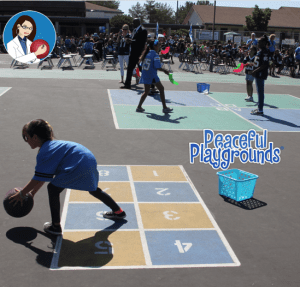Limbic/mid-brain
Overview of Elementary School Recess

Nye Elementary School Playground San Diego, CA * Ball Hopscotch
Studies show that the amount of time designated for recess is diminishing in our schools today (Barros, Silver & Stein, 2009). This diminishing amount of recess minutes is having a detrimental effect on children’s learning.
The main reason for this decline is the fact that schools are being pressured to increase academic test scores for their children, even at the youngest age (Almon, 2003). Forty percent of school districts throughout the United States are reducing or deleting recess as they focus additional time and resources on teaching and learning (Jarrett, Maxwell, Dickerson, Hoge, & Yetley, 1998).
Current studies challenge the idea that limiting recess will benefit children’s academic performance. Research on the human brain shows that excessive and/or unrelieved periods of instruction can, in fact, impair one’s ability to learn and retain material (Healy, 1998; Jensen, 1998).
Additionally, recess is at the heart of a debate on the importance of the development of the whole child. Recess is seen as one of the few opportunities that children have to be active. After school hours students are often on TV screens, computers, or handheld computing devices. As a result of this, fewer and fewer children are getting the daily recommended 60 minutes of vigorous play and physical activity as recommended by the CDC.
The American Academy of Pediatrics (AAP) in the policy statement, “The Crucial Role of Recess in School,” said that recess is a “necessary component of a child’s development and, as such, it should not be withheld for punitive or academic reasons.”
The position statement concludes: “School attendance represents a unique opportunity to address nutrition and physical fitness”. Each day, 55 million US students attend school, which constitutes nearly one-half of their wakeful hours. In light of rising rates of overweight and obesity, schools have come under increased scrutiny in this area. However, schools are facing competing calls for stricter standards and greater academic achievement.”
“Ironically, minimizing or eliminating recess may be counterproductive to academic achievement, as a growing body of evidence suggests that recess promotes not only physical health and social development but also cognitive performance. Although recess and physical education both promote activity and a healthy lifestyle, it is only recess that offers children the opportunity to actually play creatively,” according to the AAP. (You can download the complete article “The Crucial Role of Recess in School”, in the Resources Section of this Course.
Since most authorities agree that recess is necessary and important to developing children. This course will look at how can we make recess better?
Crucial-Role-of-Recess-in-Schools.pdf